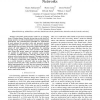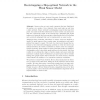422 search results - page 3 / 85 » On the Wake-Up Problem in Radio Networks |
ASPDAC
2005
ACM
14 years 8 days ago
2005
ACM
— The power consumption of the network interface plays a major role in determining the total operating lifetime of wireless networked embedded systems. In case of on-demand pagin...
INFOCOM
2007
IEEE
14 years 1 months ago
2007
IEEE
— Dual-radio, dual-processor nodes are an emerging class of Wireless Sensor Network devices that provide both lowenergy operation as well as substantially increased computational...
INFOCOM
2008
IEEE
14 years 1 months ago
2008
IEEE
—Sleep-wake scheduling is an effective mechanism to prolong the lifetime of energy-constrained wireless sensor networks. However, it incurs an additional delay for packet deliver...
ESA
2005
Springer
14 years 7 days ago
2005
Springer
Sensor nodes are very weak computers that get distributed at random on a surface. Once deployed, they must wake up and form a radio network. Sensor network bootstrapping research t...
GLOBECOM
2010
IEEE
13 years 4 months ago
2010
IEEE
In a traditional wakeup scheduling, sensor nodes start up numerous times to communicate in a period, thus consuming extra energy due to state transitions (e.g. from the sleep state...


